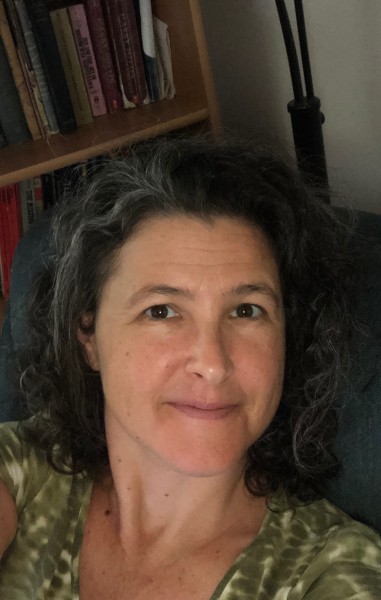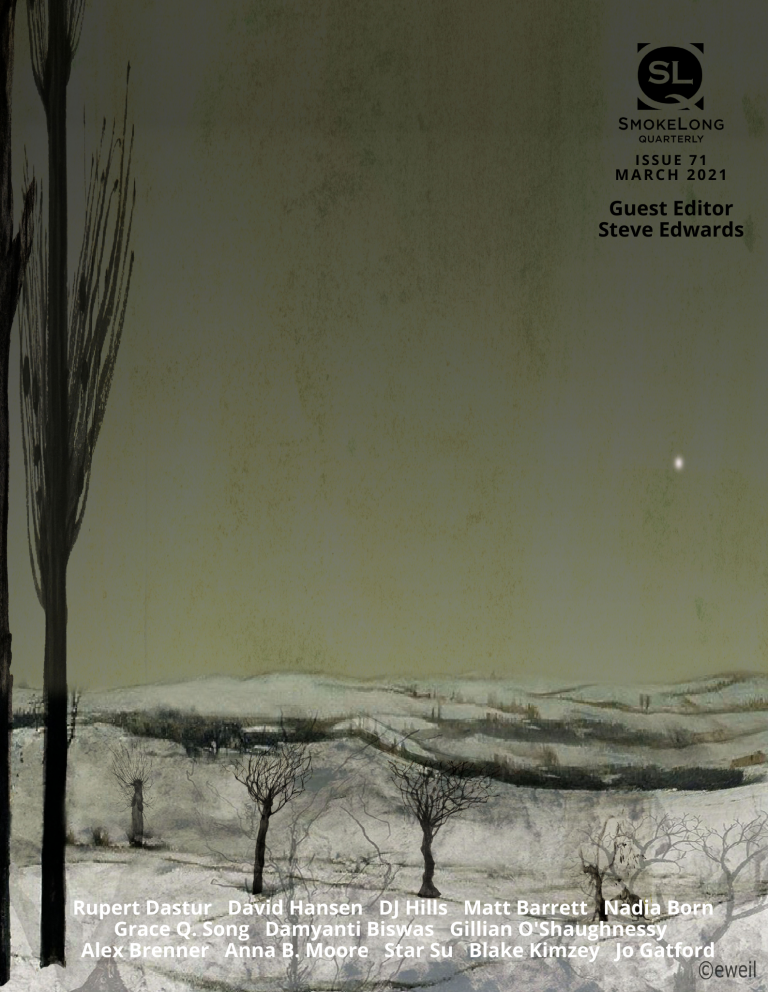In the beginning of “Mad Dog, 1988,” your character is searching for loose change, but we quickly learn that her real search is much more complicated: It’s a search for herself. For her place. For humanity. Which part of her search first compelled you to write this story? Which part encouraged you to finish it?
Her desire for acceptance, definitely, kind of the grand point of the story. Her Self, her place, her humanity—all of that is really lost in her desperation to be loved. Finding those coins means she can a) get drunk, b) participate in social life, c) feel accepted even when she isn’t, d) be that crazy party girl that she wrongly idealizes. She’s pretty much done for. Once I accepted this about her, that this character was heading into humiliation and degradation, and that there was nothing stopping it, I was set to go.
At first, I ended it with her drinking alone in her room, and that had some poignant images, but it was flat and underwhelming. I tend to rely on images when I should consider supporting my themes in other ways. And then I realized: Of course, once she’s drunk, she’s gained confidence; her delusions of being popular and truly accepted feel like truth, so she’s going to decide to go out and find others to party with. To be with. Being drunk will make her try harder, not ponder as she looks out a window. And in a way, even though her efforts are fueled by false confidence and addiction, those efforts are a testament to her strength. She’s not going to stop trying. She’s not going to stop putting herself out there. In her own way, she’s saying fuck you to all her insecurity and taking action against it.
Your use of second person creates a beautiful distance between the character’s self awareness and her addiction. Was it always your intention to use second person in this piece or was it something that developed as you wrote?
Second person all the way, right away. She is being told what to do by a lot of different sources—her father, who was a drunk, who set the example of what alcohol was for. Her biology, which predisposes her to be a drunk and whispers to her all the time. Her pop-culture idea that she’s being cool as she looks for coins to drink rot-gut. She’s really just following orders. And getting drunk feels good anyway, suppresses a lot of the shame. She’s in the cycle.
With only two sentences, you reveal the complexity of the protagonist’s home life and connect it to her alcoholism. What was your process when generating these subtle details and how did you choose which to include?
Wow. That’s a great question. I’m so glad those sentences worked. The details popped in when I thought about how when I was in college, in a dorm, the lives of everyone else became visible. I compared what I had—clothes, knickknacks, products—to what everyone else had, and through looking at those material things, I realized that my life had not been what I thought it was. This knowledge can be painful—basically it means suddenly realizing that you aren’t as “normal” as you thought. And as an addict, that’s another thing this narrator doesn’t deal with. Instead, she just adds deprivation to her Reasons to Get Wasted list.
The scene with the boyfriend in particular broke my heart, and we find her searching for a similar connection at the end of the story, too. What advice would you give her, if you could, to help her in her search?
Yeah, that’s a doozy.
I would send a mentor down from the sky to show her how to create beauty and make art and delve into her intellect. I’d give her some stuff to do. Help her develop a passion for something, a discipline. I’d make her aware of the world outside of her own, and help her know how to use her privilege to support others. All of that and any of that can make the world better and also keep us from following those orders in our heads. But dang. I don’t know that anything would’ve worked. Not for her.
One of my favorite lines is when she asks herself if scavenging for change for Mad Dog is “glamourous in ways that most people do not comprehend.” What are some other acts you find glamorous in this same way?
I was aiming for a whole lot in that sentence, so I’ll just zoom in on what fueled it. Decades ago I was reading an essay by Patricia Williams—I think it was in The Alchemy of Race and Rights, but I’m not sure. She so acutely captured the way that advertising and fashion make “cool” and trendy the appearance of being poor. Torn clothing is one obvious example. I was a helluva lot younger then, and that essay and more of her brilliant work made me fully understand for the first time how industries of all kinds, from fashion to entertainment, exploit the poor and people of color for corporate financial gain. So that’s what I was thinking of when I wrote that one line—that this narrator has been taken in by not only her own insecurities, but by the glamorization of poverty, too. You do not see much, if any, of this in the rest of “Mad Dog.” But of course that’s how writing works—little wisps of everything you’ve ever read and written are always there, informing every word.



 The core workshop of SmokeLong Fitness is all in writing, so you can take part from anywhere at anytime. We are excited about creating a supportive, consistent and structured environment for flash writers to work on their craft in a community. We are thrilled and proud to say that our workshop participants have won, placed, or been listed in every major flash competition. Community works.
The core workshop of SmokeLong Fitness is all in writing, so you can take part from anywhere at anytime. We are excited about creating a supportive, consistent and structured environment for flash writers to work on their craft in a community. We are thrilled and proud to say that our workshop participants have won, placed, or been listed in every major flash competition. Community works.